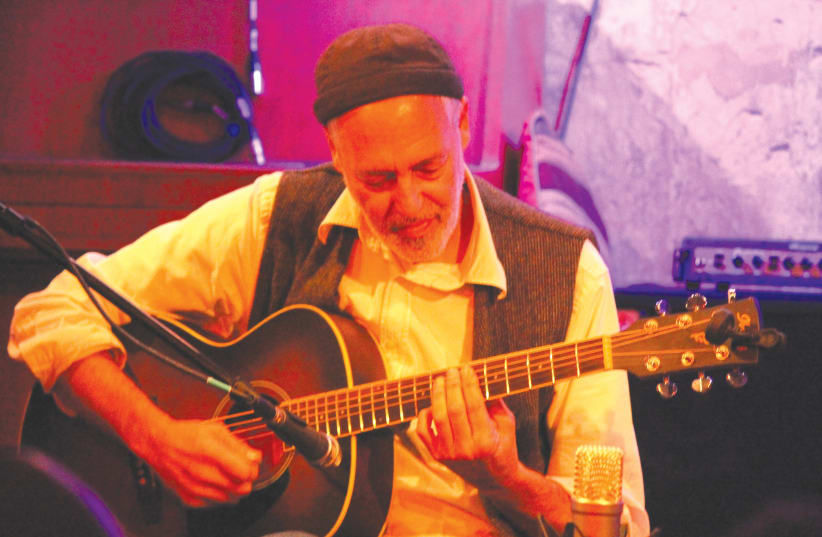That is currently on offer courtesy of the jazz performance department of the Jerusalem Academy of Music and Dance, as part of its jazz series which started out at the beginning of the year, with five more shows due to go between now and February 14.
On February 7 (7 p.m.), a showcase will feature the music of one of the iconic figures of jazz history, trumpeter Miles Davis. The student sextet that will present some of his charts being put through its paces by US-born longtime Jerusalem resident guitarist and educator Steve Peskoff, a much respected veteran of the Israeli jazz scene.
Truth be told, Peskoff’s charges have an abundance of ground to choose from. Davis started out with the pioneers of the bebop revolution which spearheaded what became known as modern jazz. Over the course of close to five decades, Davis became not only a major figure of the international jazz scene, he frequently led the way, repeatedly bending the established and shining a light into uncharted improvisational realms.
Following Davis’s timeline is akin to following the evolution of modern jazz. The trumpeter was always looking for new ground to break, sometimes spearheading new sonic ventures. Hence, it made sense to try to track the way things panned out for Davis across his long career.
“I thought it would be best to work chronologically. So I started off the semester with old stuff of Miles. Not that old, but let’s say pre-1960s Miles,” Peskoff notes.
That, just about, took in Davis’s best-known record, 1959’s Kind of Blue.
“We did some stuff from Kind of Blue, and we did the old Milestones and the new Milestones.” The former came out the year before Kind of Blue and is said to be the forerunner of the innovative modal jazz form which made such significant waves across the global jazz community, and contributed to the 1959 disc’s unprecedented success at the box office and in the record stores.
The teacher and his budding artists had their work cut out for them.
“They are first-year students and they haven’t developed a tremendous amount of skill yet,” the guitarist explains. “We also did [Davis’s 1963 release] Seven Steps to Heaven.”
Logistics, as we all know, these days, frequently tend to get in the way. “Because of the coronavirus we haven’t been able to meet a lot. We did something, I think, in November when we had a brief window, when it was okay for us to meet, and then there was another lockdown.”
PESKOFF SAYS he doesn’t remember exactly when he first got into Davis himself, but encountering his oeuvre helped to fire an awareness of the discipline.
“You start with jazz, and right away you come across Miles Davis. How can you miss him?” Peskoff laughs, adding that, on a practical level, he was oriented that way from the off. “I started with listening to pop – you know, the Beatles and all that. But in terms of playing, I starting playing blues, blues and country music, Americana stuff. I got into electric blues. I was really into Hendrix and Johnny Winter, around the late sixties, early seventies.”
It was, in fact, a former Davis sideman who really helped smooth Peskoff’s entry into the heady realms of jazz, as he followed something of a reverse continuum.
“I got exposed to the later Coltrane stuff,” he says, referencing the iconic saxophonist who was at the forefront of avant-garde jazz of the 1960s, and played in Davis’s band in the 1950s, including on Kind of Blue. “Then I worked my way backwards from Coltrane,” he chuckles. “I listened to things like [1966 record] Ascension. Look, I was a teenager and that was psychedelic. I was discovering the exotic in the world. Ascension was exotic.”
It was another Davis collaborator who really brought Peskoff into the trumpeter’s sonic orbit. “I might have gotten into Miles, actually, listening to [pianist] Bill Evans, just on the radio. I think it was [1968 release] Bill Evans at [the] Montreux [Jazz Festival]. That’s when I really got turned onto jazz.”
Evans was noted for his ability to infuse romantic lyricism with tension, and Davis was no slouch at the caressive end of the jazz spectrum either.
“No one could play a ballad better than Miles,” Peskoff states. “And he was an interesting person.”
He certainly was, and he could be abrasive and outspoken, too. Like many of his fellow African-Americans, he fell foul of the strong arm of the law enforcers in the States, but he had no skin color biases when it came to his craft.
“On the one hand he was very much involved in black identity, black roots, and he was very vocal about black culture,” Peskoff observes. “But, when he got criticized [by blacks] for having white musicians in his band, he said if you can find a black guy that can play like this, I’ll take him. For Miles it was about the music.”
That is a message Peskoff imparted to his students and which, no doubt, will come across in their online gig.
The Davis show will be preceded, Wednesday evening, February 3 (7 p.m.), by a tribute to 1970s-’80s seminal fusion outfit Weather Report, overseen by seasoned keyboardist Avi Adrian.
Immediately after the Peskoff gig, on the same evening, Yossi Levy’s six-piece band will play a selection of guitar-based jazz.
The February 10 series slot features a sextet playing original music written by seasoned drummer Yaki Levy, and the season closes on February 14 with pianist-educator Katia Toobool’s student band presenting works associated with saxophonist Jackie McLean, one of the leading lights of the fusion and avant-garde jazz scenes in the 1950s and 1960s.
For more information: https://jamd.ac.il
